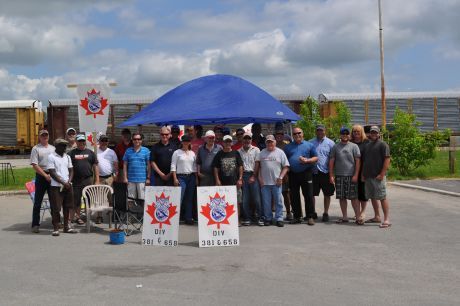Shared
You are here
Workers at CP get railroaded

May 27, 2012
On May 23, 4800 CP Rail workers went on strike after giving a 72-hour strike notice on May 19. The workers, represented by the Teamsters Rail Conference of Canada, had voted 95 percent in favour of a strike on April 27.
The major issue is pensions, but there are also other areas of dispute such as fatigue management and workplace safety. The company is seeking to devalue existing pensions by 40 percent in a move that would affect both new hires and long-time CP workers who have paid into the company pension plan for years.
Minister of Labour, Lisa Raitt, invited both the union and company representatives to a joint meeting in Ottawa on May 22, with the hope of avoiding a strike. At best, the government’s attempt at fostering a dialogue between the two parties paid lip service to tripartite negotiations. In her meeting with the union the day before the strike, Raitt made no mention of intervention, prompting the union to issue a press release stating:
“Brother [TCRC Vice President Doug] Finnson has reported that the Minister is keenly interested in the progress of our bargaining but at this time she will not be interfering with the process. The rest of our bargaining committee are now arranging to convene in Ottawa to continue bargaining with the Company.” (source)
Just after midnight on May 23 the union went on strike and in less than a day, Minister Raitt was already threatening back-to-work legislation.
As with back-to-work legislation against Air Canada baggage handlers, mechanics, ground crew and pilots in March, Raitt cited the “economy” as her justification to intervene. While making such threats, she still claimed to support a “freely” established agreement between CP Rail and the union. After threats and the imposition of back-to-work legislation against four separate unions representing Air Canada workers between June 2011 and March 2012, CP Rail is now the second privately-owned company to witness back-to-work legislation threats since the Tories were elected on May 2, 2011. Historically, back-to-work legislation has almost exclusively been used against public sector strikes at the provincial and federal level. The Conservative’s use of this regressive legislation in private sector negotiations – and in the case of Air Canada, even before the outbreak of a strike – indicates that the government is committed to breaking the convention of fair and free collective bargaining in Canada’s industrial relations system.
For the rest of the article, including audio files, go here: http://rankandfile.ca/?p=93.
Section:
Topics:
- Log in to post comments









